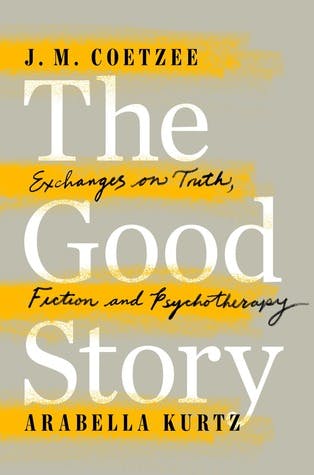In 2008, a British clinical psychologist, Arabella Kurtz, invited Nobel Prize-winning novelist J.M. Coetzee to participate in a public discussion about literature and psychoanalysis. The notoriously publicity-averse Coetzee, who hardly ever gives interviews, predictably refused. “I suspect I am not the right person for the job,” he wrote to her. “I am not a fluent speaker and don’t easily see the point of questions. I am also dubious of the worth of opinions that are expressed by my public persona.” His past interviewers, to whom Coetzee inevitably gives a difficult time, would likely agree. Yet Coetzee overcame his reservations and eventually agreed to exchange letters with Kurtz, producing a five-year correspondence that has now been published in book form as The Good Story: Exchanges on Truth, Fiction and Psychotherapy.

For any admirer of Coetzee, the collection is a rare opportunity to understand the mind of a writer who almost never speaks at length in his own voice. For many years, when called up to deliver lectures, he would instead read out a story about a writer invited to deliver a lecture. (Some of these stories made their way into his 2003 novel Elizabeth Costello.) Indeed, for a while, it seemed that fiction was the only medium through which Coetzee would engage with the world. Made-up characters narrate sections of his autobiography. Even his Nobel Lecture took the the form of a story, a cryptic one that.
“What relationship do I have with my life history,” Coetzee asks in his first letter. “Am I its conscious author, or should I think of myself as simply a voice uttering with as little interference as possible a stream of words welling up from my interior?” As its subtitle suggests, The Good Story is interested in the relationship between storytelling and truth, a subject that is as relevant to Kurtz’s profession as it is to Coetzee’s. We tell ourselves a narrative about our life, and this account is always subjective. When patients visit therapists with the hope of feeling better, they are, in a sense, searching for a story that casts their lives in a kinder light.
Kurtz had reached out to Coetzee because of his fiction’s unconventional depiction of interiority, his particular focus on the inner mind and its thought processes. His novels operate in those deep, Dostoyevskian realms of introspection from where people seldom emerge enthused about life. He asks questions about existence that people don’t ask, and should not ask, if they want to simply live a comfortable life. His books are not therapeutic; they are written to discomfort.
A psychologist, Kurtz has a more pragmatic understanding of human nature, of the ways in which people express their internal troubles and learn to overcome them. In fact, what is most bracing about The Good Story is her combative approach. Kurtz, importantly, is prepared to firmly critique Coetzee, something even a celebrated writer like Paul Auster was unwilling to do in their published correspondence, Here and Now. She rigorously examines his subtle ideas, and is especially suspicious of what he has to say about truth. And Coetzee, a Nobel Laureate and two-time Booker winner, humbly accepts her criticism. The pleasures of this book lie in the ways they absorb one another’s critiques, adjust their claims, and—sometimes—exchange positions.
Focusing on the question of personal narrative, Coetzee crafts an opening provocation that would madden most psychotherapists. He asks Kurtz,
What is it that impels you, as a therapist, to want your patient to confront the truth about themselves, as opposed to collaboration or colluding in a story—let us call it a fiction, but an empowering fiction—that would make the patient feel good about themself, good enough to go out into the world better able to love and work?
This is basically an ethical accusation: Coetzee wants to know why psychoanalysts care about the truth, if their job is simply to make patients feel better. Readers familiar with his work won’t be surprised by this attack. Coetzee has made a career out of examining the motivations that drive people—and communities—to create stories about themselves. He is always on the lookout for weakness that masks itself as moralizing, for the memory that is conveniently forgotten for the sake of a clean conscience.
In response, Kurtz tells Coetzee that his ethical proposition has little traction in the real world, where truth and utility are not so neatly at odds. “Of course one must content oneself with a version of the truth that works,” she writes. “But my experience is the truth IS what works.” Self-delusion, in Kurtz’s experience, can’t make a person happy. A patient must address the truths about her life, however harsh they are, in order to attain any kind of peace.
Instead of resolutely defending literature and the imagination—as one might expect a writer to do—Coetzee repeatedly expresses his suspicion of fiction’s relation to life. Imagination, he believes, is often used to present a convenient rather than wholesome picture of life. It is Kurtz who has to chide a cynical Coetzee for espousing “a sticky, ritualistic attachment to the concrete, object world” and taking a “disapproving and puritanical” attitude towards fantasy. But for Coetzee, even confession—an act most people associate with the highest form of honesty—can be driven by self-serving and self-deluding motivations.
This suspicion is, ironically, a central part of the story Coetzee tells about himself, about growing up as a white man in apartheid South Africa and learning to distrust the uses of personal and collective narrative. In a remarkable passage, Coetzee confesses that this obsession with the ethical dimension of narrative derives, in part, from his own upbringing. “I have lived as a member of the conquering group … [which] believed that what it was achieving in settling a foreign land was something to be proud of,” he confesses. It’s a brief, and convincing, reminder of the origins of Coetzee’s cynicism; the collective narrative a community tells about itself can have powerful, and dangerous, effects.
